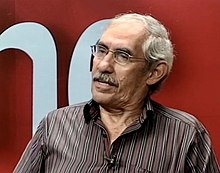| Moisés Hassan | |
|---|---|
 Hassan in 2016 Hassan in 2016 | |
| Born | (1942-05-04) May 4, 1942 (age 82) Managua, Nicaragua |
| Alma mater | National Autonomous University of Nicaragua North Carolina State University |
Moisés Hassan Morales (born May 4, 1942) is a Nicaraguan politician. He was one of five members of the Junta of National Reconstruction that ruled the country from 1979 to 1984, following the fall of the Somozas regime.
Early life
Born in Managua on May 4, 1942, to Nicaraguan mother and Palestinian father from Gaza, Hassan studied engineering at the National Autonomous University of Nicaragua (UNAN). In 1968 he earned a PhD in physics from North Carolina State University in Raleigh, North Carolina.
Career and militancy
Hassan was a long-time dissident and early FSLN member. He attended his first protest against the Somoza dictatorship in 1958 and was jailed several times for his continued dissidence. He joined the FSLN in its infancy in the 1960s and was a key figure in the organization by the time the uprising came to a head in the late '70s, having built a network of subversives in Managua’s slums.
He was the dean of the UNAN's College of Science and Letters until he joined the anti-Somozas effort in 1978. He was head of the activist National Association of Professors and became its delegate to the United People's Movement, a coalition of civic groups supporting the Sandinistas, which he founded in 1978.
He led the September 1978 uprising against the regime.
In 1979, he joined the five-member Junta of National Reconstruction (RN), alongside fellow Sandinistas, intellectual Sergio Ramírez and commander Daniel Ortega, as well as Violeta Chamorro, widow of La Prensa publisher Pedro Joaquín Chamorro Cardenal; and prominent businessman Alfonso Robelo. Hassan left the RN in March 1981.
Hassan served as Minister of Construction until he became Vice-Minister of the Interior in May 1983. From 1984 to 1988, he was Mayor of Managua. His technical skills made him valuable in that capacity, dealing with persistent flooding in the capital.
Hassan split with the FSLN in 1988. He was removed from his post as Mayor for failure to follow orders from the nine-member FSLN National Directorate, at times at odds with ideological hardline members Tomás Borge and Bayardo Arce. Hassan resigned the party shortly thereafter.
On December 16, 2009, he published La maldición de Güegüense.
His papers are held at the Hoover Institution Library and Archives at Stanford University, acquired in 2002.
References
- ^ Affairs, United States Department of State Bureau of Public (1988). Nicaraguan Biographies: A Resource Book. U.S. Department of State, Bureau of Public Affairs. pp. 26–28. Archived from the original on 2021-01-31. Retrieved 2020-12-17.
 This article incorporates text from this source, which is in the public domain.
This article incorporates text from this source, which is in the public domain.
- ^ DeYoung, Karen (22 July 1979). "Uneasy Alliance of Rebels, Businessmen to Rule Nicaragua". Washington Post. Archived from the original on 31 January 2021. Retrieved 16 December 2020.
- "Sketches of the Nicaraguan Junta's Five Members". The New York Times. 1979-07-18. ISSN 0362-4331. Archived from the original on 2021-01-31. Retrieved 2020-12-16.
- ^ "Inventory of the Moisés Hassan M. papers". oac.cdlib.org. Archived from the original on 2020-08-05. Retrieved 2020-12-17.
- ^ Kinzer, Stephen (1988-05-08). "In Managua, Not Exactly Last Hurrah (Published 1988)". The New York Times. ISSN 0362-4331. Archived from the original on 2016-07-28. Retrieved 2020-12-29.
- Ameringer, Charles D. (1992). Political Parties of the Americas, 1980s to 1990s: Canada, Latin America, and the West Indies. Greenwood Publishing Group. p. 473. ISBN 978-0-313-27418-3. Archived from the original on 2020-10-03. Retrieved 2020-12-16.
- Mendieta Herdocia, Mauricio (2009-12-24). "Comentarios al libro de Moisés Hassan "La maldición del Güegüense"". La Prensa (in Spanish). Archived from the original on 2021-01-31. Retrieved 2020-12-18.